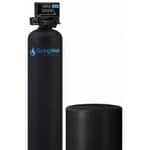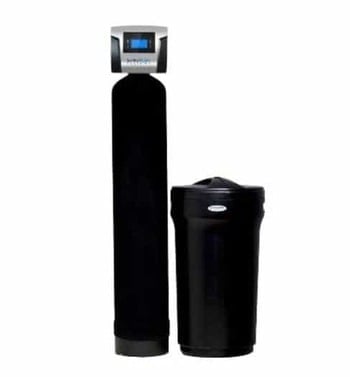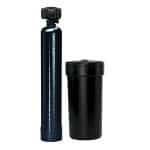Not sure which softener fits your well water? You’re not alone. Water quality can vary drastically — even between neighboring homes. That’s why we mapped out the top softeners based on real-world use cases, like severe iron, high water demand, or set-it-and-forget-it operation.
💧 Best Water Softeners for Well Water – By Use Case
- Best Overall for Well Water: SpringWell SS1 — High-performance salt-based softener with Bluetooth control, strong flow rate, and moderate iron removal
- Best for Efficiency + Iron Control: SoftPro Elite Well+ — Upflow metered system with SmartClean cycle and fine mesh resin for up to 4 ppm iron
- Best Budget Option: Fleck Iron Pro — Affordable, DIY-friendly softener with built-in iron reduction and proven well water performance
- Best High-End Tech System: USWS Matrixx Softener — Touchscreen valve, Vortech tank, and filter pairing support for advanced well installs
- Best Accessible Starter System: Aquasure Harmony Series — Entry-level softener with solid specs, digital controls, and an approachable price point
#1 Springwell SS1 – Best Overall
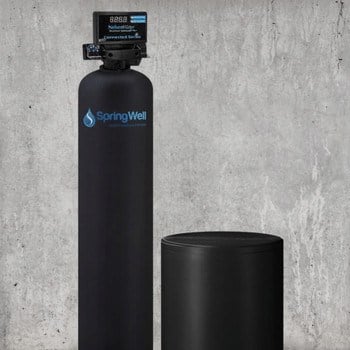
It’s the only system that consistently removes scale and iron without tank pressure drops or salt waste. The Bluetooth head might look clunky, but once it’s set, you won’t touch it again.
Smart regeneration cycles mean fewer salt refills, quieter operation, and no guessing when to top off. It’s a softener that does what it says — reliably, quietly, and without drama.
If your water’s ruining appliances or your old softener keeps running at 2 a.m., this is the upgrade.
Why we like it:
- ✅ Regenerates only when needed — saves salt and water
- 📱 Bluetooth lets you monitor everything from your phone
- 💧 No pressure loss, even with multiple taps running
- 🔧 Bypass valve makes maintenance dead simple
- 🔄 Can be paired with SpringWell’s iron filter (WSSS) if your water has serious odor or staining
Use Coupon Code: QWL5 to save
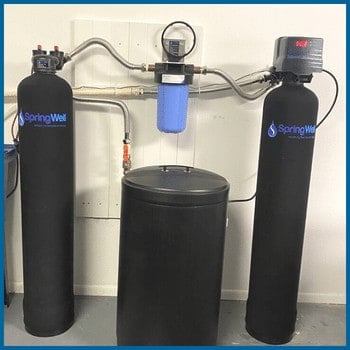
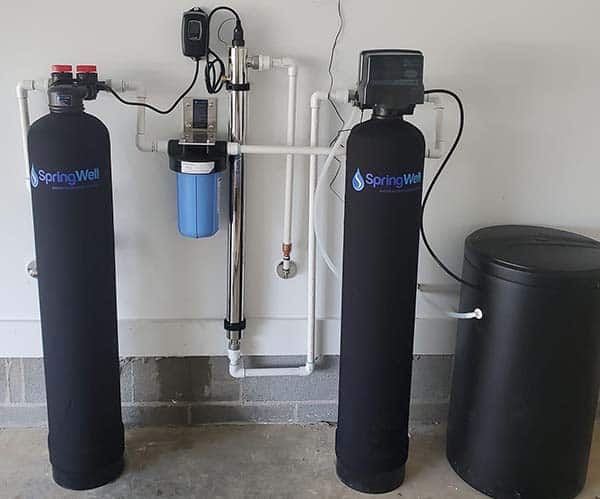
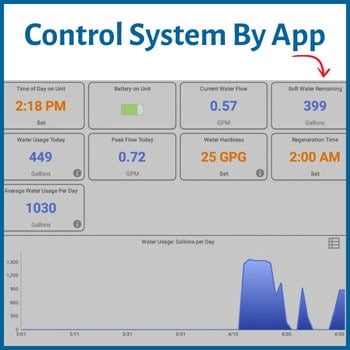
💡 Here’s the deal: You don’t realize how bad your old softener was until you install the SS1. Water feels noticeably better — not just in the shower, but in places like the dishwasher and laundry. And the fact that it doesn’t make noise or constantly regenerate in the background? You stop noticing it because nothing’s going wrong — which is exactly how a system like this should feel.
⚠️ Heads-up: SpringWell ships it with 1” fittings by default — if your home uses ¾” lines, you’ll need to grab adapters. It’s a simple fix, but easy to overlook if you’re not prepped.
👍 Pros
- 🧂 Salt fills last longer than you think — some users go 3+ months without touching the brine tank
- 🔇 You’ll second guess if it’s working because it’s that quiet — no whooshing, no valve clicks, nothing
- 🧱 The bypass handle isn’t plastic junk — it actually feels solid and clicks clean when toggled
- 🚿 Showerhead gunk buildup basically stops — even in high-iron wells
- 🧼 Water softens laundry detergent — you’ll use way less and whites stay white
- 📦 The packaging is no joke — tanks arrive secure and pre-charged, no resin mess, no cracked fittings
👎 Cons
- 🧠 The app doesn’t remember your flow rate history if you disconnect or swap phones
- 📐 The system’s tall — not a great fit under low crawlspaces without re-routing lines
- 🛒 Replacement parts aren’t “off the shelf” — you’ll need to go through SpringWell if something fails

🔧 SpringWell SS1 – Product Updates
- 🆕 New bypass valve design (2024) – Faster shutoff, no wrench needed
- 📱 Bluetooth app v2.7 (2024) – Real-time flow tracking + better pairing stability
- 🧪 Now supports SpringWell’s 15 GPM UV filter – Ideal for homes on well water with bacteria concerns
- 🏠 Multiple tank sizes added (2023) – Better fit for homes with 1–6+ bathrooms
#2 SoftPro Elite
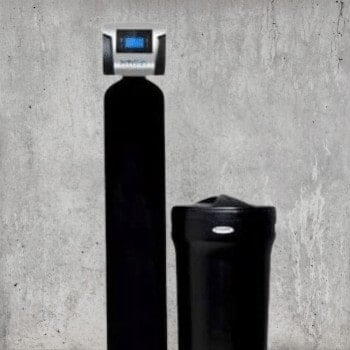
The SoftPro Elite isn’t flashy — it just solves hard water quietly, efficiently, and without drama.
You won’t get app control or sleek branding, but you’ll get steady pressure, fewer salt refills, and resin that doesn’t crap out when there’s a little iron in your well. It’s not perfect, but for the price, it’s one of the smartest water softener buys out there.
Why we like it:
- 🧮 SmartClean lets you fine-tune regen based on usage
- 🔧 Setup takes effort, but parts feel solid once in
- ⛲ Clears up mild iron staining fast (under 3 ppm)
- 🛏️ No surprise regen — it runs only when needed
- 🧂 Salt use is minimal — far better than older units
- 🧰 More tweakable than SpringWell if you like control
- 💸 High-end performance without the premium price
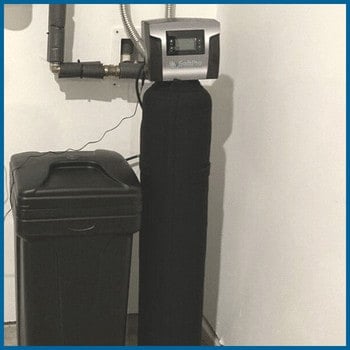
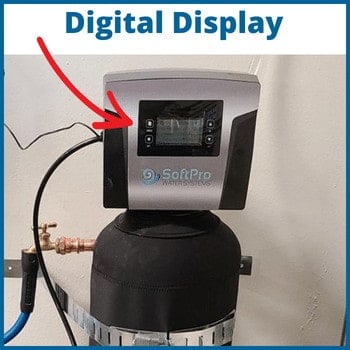
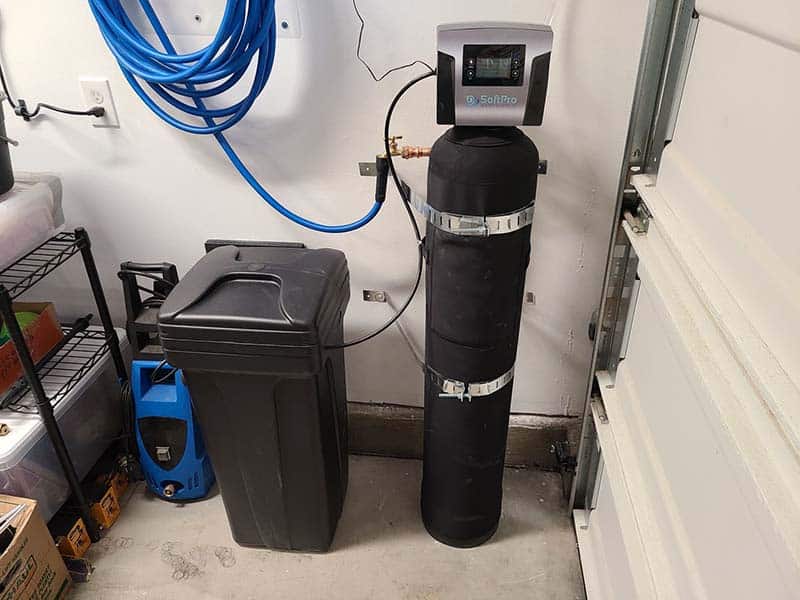
💡 Here’s the deal: If you’re coming from an older system — or no softener at all — the difference is immediate. Showers feel cleaner, iron stains start fading within days, and laundry finally stops turning that weird off-white. This isn’t some budget build either. The SmartClean cycle actually does what it promises, and if you don’t mind the install curve, it’s a set-it-and-forget-it kind of win.
⚠️ Heads-up: The default settings are decent, but if you don’t dial them in, you might not get the salt savings SoftPro is known for. Also, the valve isn’t as plug-and-play as SpringWell’s — expect a bit more plumbing finesse. And while it handles up to 3 ppm iron well, anything higher? You’ll need a dedicated iron filter (SoftPro Iron Master or SpringWell WS) or risk fouling the resin over time.
👍 Pros
- 🧲 Resin doesn’t iron-foul like cheaper systems — even after months with 2–3 ppm
- 🚿 The bypass valve is actually solid — easy to shut off and service without leaks
- 🔌 System recovers fast after power outages — no need to reprogram everything
- 🔊 You can actually hear the difference in how appliances run (dishwasher hums smoother)
- 📈 Rarely dry fires — it adapts well even when water usage spikes unexpectedly
👎 Cons
- 🧱 The brine tank lid doesn’t always stay flush — not a dealbreaker, but annoying
- 📵 No mobile app — you’re stuck using the head unit for changes
- 🌦️ If your iron fluctuates seasonally, expect to re-tweak settings at least twice a year
💬 What One Owner Said: “We’re on a private well in Ohio, and iron was always a nightmare. Took a few days to dial in, but once it kicked in — the stains just stopped. No more sulfur smell, and we’re barely using any salt.”
🔧 SoftPro Elite – Product Updates
- 📱 Simplified programming interface (2023) – Updated control head layout ditches jargon-heavy menus for plain-English prompts
- 🧵 New insulation wrap included – Neoprene tank jacket now bundled with most sizes to reduce sweating and condensation
- 🧪 Expanded softening resin choices – Optional upgrade to high-capacity, chlorine-resistant resin for municipal crossover use
- 💸 Added budget-tier model (2024) – “Essential” version now available with same metered regen but fewer frills for cost savings
#3 Fleck Iron Pro
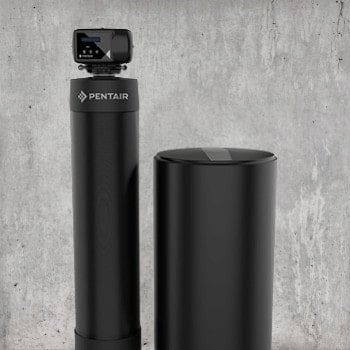
The Fleck Iron Pro isn’t fancy, but it’s earned its stripes with well owners. Its built-in iron filter tackles rust stains and metallic taste while softening hard water — all without needing a second tank. It takes some finesse to set up, but once tuned, it runs quietly and reliably.
Why we like it:
- 🧠 Not flashy, but the SXT head gives full control over regen timing, cycles, and salt dose
- 🔩 Parts feel solid — no rattling valves or cheap clamps
- 🧲 Handles iron up to 3 ppm without choking the resin or cutting flow
- 🔧 More configurable than SpringWell or SoftPro if you know what you’re doing
- 🧃 Quick brine draw and low salt use once dialed in
- 💡 No app, no Bluetooth — just a dependable screen that does its job
- 💰 Dollar for dollar, it’s one of the best dual-function (iron + hardness) setups on the market
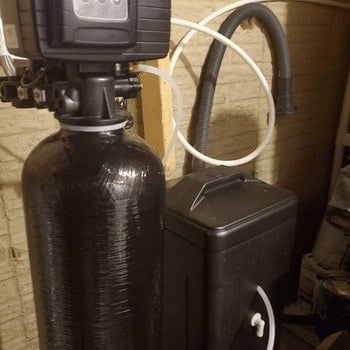
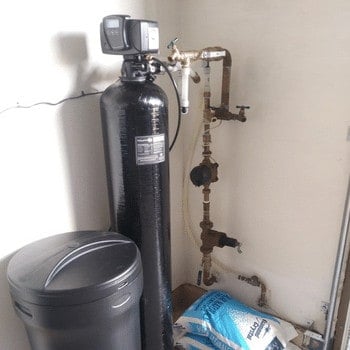
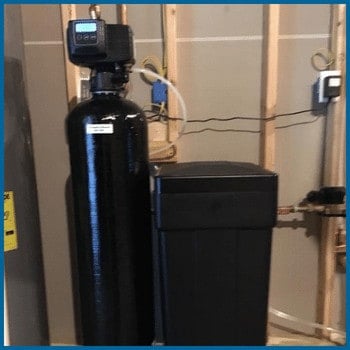
💡 Here’s the deal: The Fleck Iron Pro is for the DIYer who doesn’t need hand-holding. You’re not paying for marketing fluff — just solid hardware that can go 10+ years with basic care. Once programmed right, it’s a dual-threat system that softens and removes iron without hogging salt or tank space. It’s not as polished as SpringWell or SoftPro, but you get full control, more sizing options, and a price that’s tough to beat.
⚠️ Heads up: This system assumes you know how to set it up. The default regen cycle isn’t optimized for well water with iron, and many users never realize they’re under-treating or over-wasting salt. Also, Fleck doesn’t include a sediment pre-filter — and you’ll absolutely want one to protect the resin. Skip this step, and the system’s lifespan (and performance) drops fast.
👍 Pros
- 🧽 Resin doesn’t foul easily if you pre-filter — users running it 5+ years with no media change
- 🧑🔧 You can replace every part of the system yourself — valve, piston, injector, all of it
- 📦 Ships in separate boxes, so it’s easier to carry down to basements or tight installs
- 📉 Doesn’t spike your water bill — the metered system learns and adapts to usage quickly
- 🔌 Can be programmed to regenerate at specific hours to avoid waking the household
👎 Cons
- 📘 Learning curve is steep — expect to spend time with the manual (or YouTube)
- 🧪 No built-in test feedback — you’ll need to test water regularly to keep it running right
💬 What One Owner Said: “We live out in northern Georgia, and I set this up myself with help from YouTube. It’s not perfect, but it’s handled our hard water and rust stains way better than I expected. Reliable and simple.”
Product Updates
- Now offers multiple grain sizes to accommodate larger homes
#4 US Water Systems Matrixx
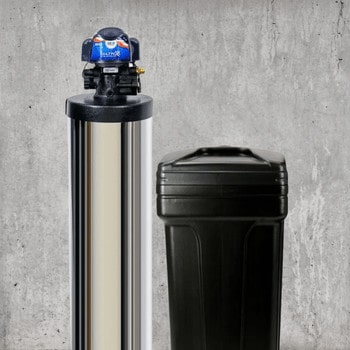
If you want full control over your softener settings, this is it. The Matrixx lets you fine-tune regen cycles, salt use, and backwash — and it’s whisper-quiet while doing it. Not as turnkey as others, but once dialed in, it’s rock solid.
What We Like
- ⚙️ Custom settings let you fine-tune for iron, hardness, or sulfur without guesswork
- 🤫 Whisper-quiet regen — no “whooshing” sounds like older Fleck units
- ♻️ Vortech tank boosts backwash efficiency and extends media life
- 📱 Touchscreen or Bluetooth control — your choice
- 🇺🇸 Built in the U.S. with WQA-certified components
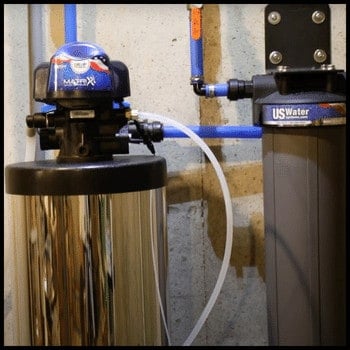
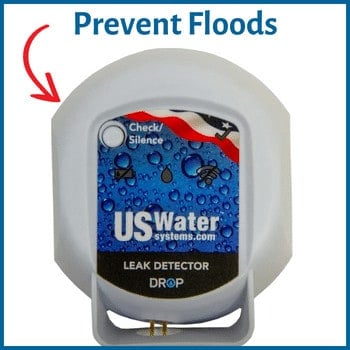

💡 Here’s the Deal: If you like being hands-on, the Matrixx gives you room to dial it in just the way you want. It’s not plug-and-play like SpringWell — setup takes a bit of effort. But once it’s running, it stays quiet, works reliably, and the app isn’t just for show.
⚠️ Heads-up: Matrixx systems are built to last — but only if you follow the install guide closely. The touchscreen interface is straightforward, but setup isn’t as forgiving as plug-and-play models. And while support is US-based and helpful, most parts are proprietary — not something you’ll find at a local hardware store.
✅ Pros
- 💡 The touchscreen isn’t just pretty — it tells you when your system’s working harder than usual, which helped one owner realize their well pump was failing
- 🔇 Dead silent during regeneration — no clunking, no hum, just peace (you forget it’s even there)
- 🧮 Tracks water usage to the gallon — one guy realized his teenage daughter was burning 50 gallons a shower
- 🧰 Installers rave about the Vortech tank — backwashes better, needs less salt, and won’t channel as easily as standard resin beds
- 🏠 Feels built for a “forever home” — one reviewer said, “I don’t plan to replace this unless I move.”
❌ Cons
- 📦 Programming isn’t super intuitive unless you’re tech-savvy — expect a little head-scratching on day one
- 🧾 Not the cheapest — and you’ll likely want a pre-filter or extra fittings if your well throws sediment
💬 What One Owner Said: “In central Pennsylvania, iron is just part of life with a well. The Matrixx made a difference right away — even our tub and sinks stay white now. And I actually like messing with the touchscreen.”
Product Updates
- Now offers connected salt level detector – this is a wireless salt level monitoring system that will notify you when your salt levels get to low.
#5 Aquasure Harmony Series
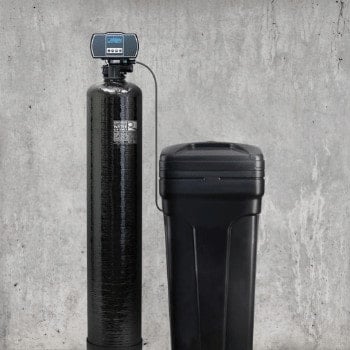
This is the one you grab when you want something that works — without overthinking it. The Aquasure Harmony doesn’t try to be the smartest or sleekest system out there, and honestly, that’s its charm.
It’s easy to program, doesn’t take up much space, and softens water well enough for a typical household on a tight budget.
🔧 What We Like
- 💰 Surprisingly solid for the price — softens reliably without overcomplicating things
- 📦 Compact footprint — installs easily in tight utility closets or garage corners
- 🧠 Set it and forget it — once programmed, it runs quietly in the background
- 🔁 Regenerates efficiently — uses metered control to avoid wasted salt or water
- 🪛 DIY-ready — includes everything you need to get started without upsells
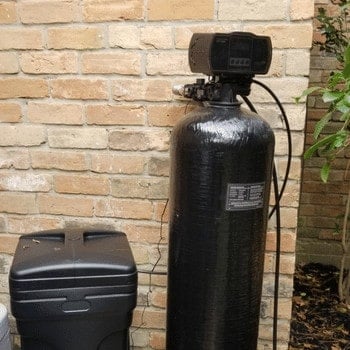
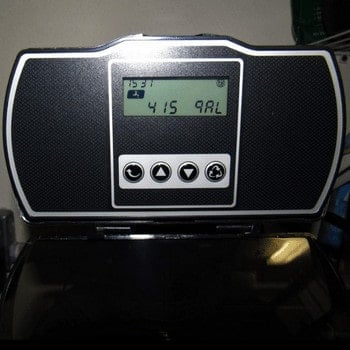
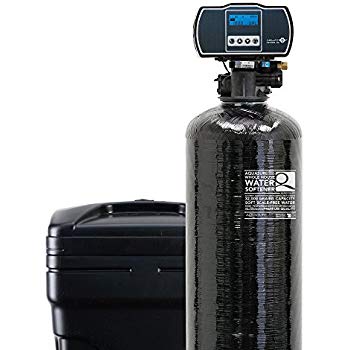
💬 Here’s the Deal: If you just need soft water and don’t care about bells and whistles, the Aquasure Harmony delivers. It’s not built like a tank, and it won’t text your phone when it regenerates — but for many well water households, it gets the job done quietly and affordably. Think of it as the “Toyota Corolla” of softeners: not flashy, but dependable.
⚠️ Heads Up: This isn’t the system for extreme iron or manganese — the resin can foul quickly without a prefilter. Also, the valve design is fairly generic, so don’t expect premium build quality. But for basic hard water, it’s a budget-friendly option that holds its own.
👍 Pros
- 🚿 You’ll stop noticing dry skin and stiff laundry — it kicks in fast
- 🧰 You can actually take it apart without special tools — rare at this price point
- ⚙️ Holds calibration surprisingly well — doesn’t drift or “forget” settings
- 🧪 Doesn’t clog or jam up even with minor sediment in the line
- 💡 The display isn’t fancy, but it’s readable in direct sunlight — no squinting
👎 Cons
- 🧪 No advanced iron handling — needs a separate filter for most well water setups
- 📏 The bypass valve and fittings feel a little cheap — don’t overtighten during install
💬 What One Owner Said: “I didn’t want to spend over $2k just to fix hard water here in rural Texas. This system’s been rock solid. No leaks, no pressure loss, and it just keeps going. Totally worth it for the price.”
Didn’t find what you’re looking for? See our other reviews:
🧠 How We Chose
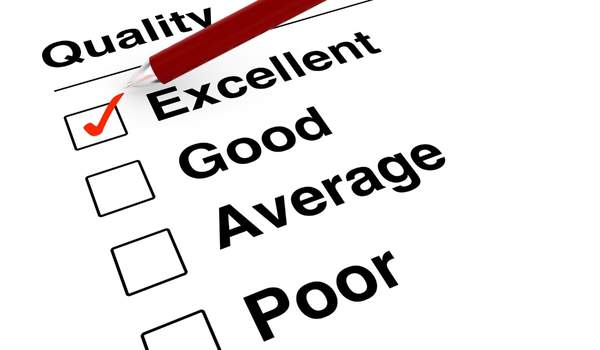
We analyzed dozens of softeners to find the few that actually hold up under real-world well water conditions — not just what looks good on paper.
Here’s what mattered most:
- Iron + Manganese Handling: Prioritized systems that control staining and metallic taste without shortening resin lifespan.
- Longevity: Many softeners break down faster on unfiltered well water. We focused on builds that hold up under high mineral loads.
- Flow Rate + Capacity: Undersized units are the #1 regret we see. We picked high-efficiency models that won’t choke water pressure during peak use.
- Smart Features: Systems with metered regeneration, salt-saving logic, or app monitoring stood out.
- Owner Reviews: We filtered out brochure claims and leaned on feedback from households on private wells.
- Installation + Maintenance: Preference went to systems that are DIY-friendly or use standard parts for easy servicing.
- Certifications: Bonus points for softeners with NSF or WQA seals to back up performance claims.
Every softener we recommend solves a specific well water issue — whether it’s heavy iron, limited space, or salt restrictions.
🛒 Buyer’s Guide

If you’re on a private well, the right softener can do more than fix hardness — it can protect your plumbing, boost water pressure, and stop iron stains before they start.
This guide isn’t just specs and jargon. We’ll show you what actually matters for well water: what works, what doesn’t, and how to avoid common traps like undersized systems or burned-out resin. Whether your water’s full of iron, bacteria, or just off-tasting, we’ll help you get it right the first time.
🧪 What Is Hard Water?
Before we get into systems and solutions, let’s clear up what we’re dealing with.
Hard water simply means your water has a high concentration of dissolved minerals — mainly calcium and magnesium. While they’re safe to drink — these minerals can be tough on plumbing and appliances.
Overtime, buildup can clog pipes, your water heater, and make a mess of your fixtures.
Well water is especially prone to hardness because it filters through mineral-rich soil and rock. That’s why homes with private wells often test above 15 grains per gallon (GPG) — high enough to need treatment.
| 💡 GPG Rating Scale | Water Hardness |
|---|---|
| 0–3 GPG | Soft (No softener needed) |
| 4–7 GPG | Moderately hard (Salt-free may work) |
| 7–15 GPG | Hard (Salt-based recommended) |
| 15+ GPG | Very hard (Heavy-duty system required) |
🧠 Expert Insight: Hardness doesn’t always look like a problem — but if you’re replacing your dishwasher early or your towels feel stiff after a wash, you’re probably paying the price.
🔍Why Water Testing Matters (More Than You Think)
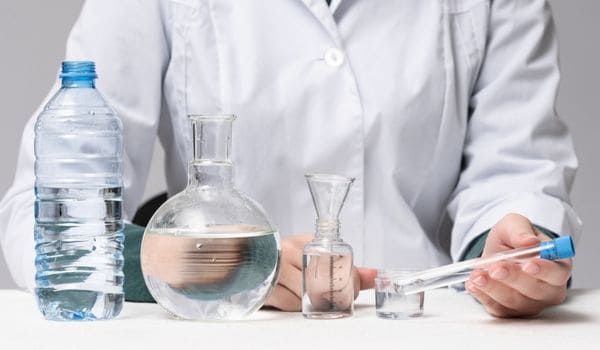
You can’t fix what you don’t measure.
Every well is different. Some wells have moderate hardness and low iron — others have triple-digit hardness and sulfur gas that smells like rotten eggs. That’s why testing isn’t just smart — it’s necessary. A water softener that works for your neighbor might fail miserably on your property.
| 🧪 Common Well Water Parameters | Ideal Range |
|---|---|
| Hardness | 0–3 GPG after treatment |
| Iron | Below 2 ppm for most softeners |
| Manganese | Below 0.05 ppm |
| Sulfur (H₂S) | None detectable |
| pH | 6.5–8.5 |
💬 Lab Tip: Even a basic $30 water test can steer you away from expensive mistakes. It’s the only way to know if you’re dealing with iron, sulfur, acidity, or something else entirely — and which system will actually solve it.
🔄 Types of Softeners for Well Water

Most people think all softeners work the same — but well water throws a curveball. Between iron, high hardness, and microbial risk, some systems just aren’t cut out for it. Here’s how the main types compare:
| System Type | How It Works | Best For | Limitations |
|---|---|---|---|
| Salt-Based (Ion Exchange) | Swaps calcium and magnesium for sodium or potassium to fully remove hardness. | High-hardness private wells with scale, staining, and plumbing damage. | Needs salt refills and regular regeneration; some towns restrict salt use. |
| Salt-Free Conditioner | Uses template-assisted crystallization (TAC) to prevent scale without removing minerals. | Moderately hard water (under ~10 GPG) where scale prevention is the goal. | Won’t reduce iron, manganese, or heavy hardness. Not ideal for most wells. |
| Dual Tank (Metered Softener) | Two resin tanks alternate, allowing uninterrupted soft water 24/7. | Larger homes or high-usage households with unpredictable demand. | Higher upfront cost and more space required. Not always needed. |
| UV + Softener Combo | Softener handles minerals; UV lamp kills bacteria before it hits your taps. | Wells that test positive for coliform or where safety is a concern. | Needs electricity and annual bulb replacement. Adds cost. |
| Electronic Descaler | Sends magnetic or electric pulses through water to reduce scale deposits. | Homes with minor scaling and no iron. Best used as a secondary tool. | Doesn’t actually soften water. Minimal impact on hard well water. |
🧠 Expert Insight: If your water test shows hardness over 10 GPG or any trace of iron, skip the salt-free hype. Most conditioners won’t cut it. Ion-exchange is still king for true well water performance.
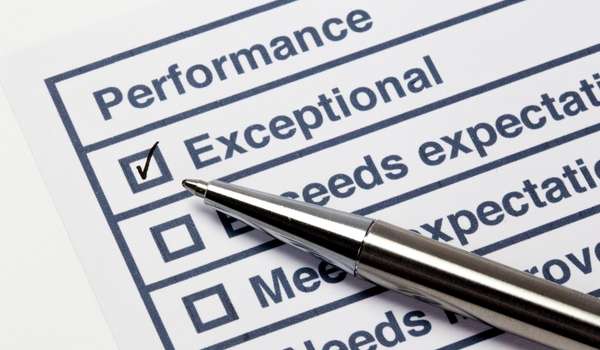
📏 Key Considerations
Before you buy a softener, double-check that it fits your home’s size, plumbing setup, and long-term needs. A system that’s too small or too complex can turn into a frustrating (and expensive) mistake.
| Factor | Why It Matters |
|---|---|
| Grain Capacity | Larger homes or high hardness levels need higher capacity (32K+ grains). |
| Flow Rate | Measured in GPM — undersized systems can choke pressure during showers or laundry. |
| Plumbing Size | Most systems work with 1” pipe — downsizing to ¾” can restrict flow. |
| Install Location | Check for space, drainage, and proximity to the main water line. |
| Electrical Access | Most digital softeners require a nearby outlet. |
🔧 Expert Insight: A higher grain capacity doesn’t mean better — it just means slower regeneration. Match your system to your usage, not your square footage.
⚖️ Salt-Based vs Salt-Free: Pros & Cons

We won’t sugarcoat it — salt-based systems are still the gold standard for softening well water. But salt-free units may work in limited cases, especially where scale prevention is the only goal.
| Type | Pros | Cons |
|---|---|---|
| Salt-Based |
|
|
| Salt-Free |
|
|
🔍 Heads Up: If you’re dealing with rust stains, scale, or sulfur odors, salt-free systems alone won’t cut it — stick with a true softener designed for well water.
⚠️ Common Mistakes to Avoid
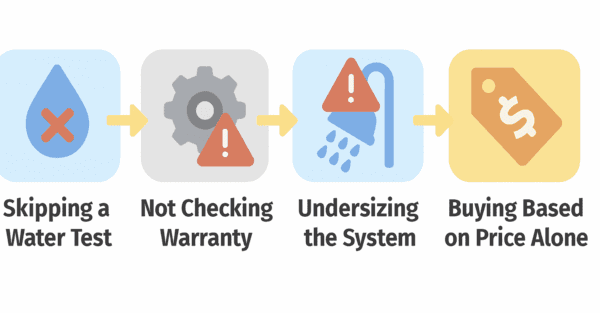
Even the best softener won’t help if it’s installed on the wrong water or sized too small. Here are the most common mistakes we see (and how to sidestep them):
| 🚫 Mistake | ✅ What to Do Instead |
|---|---|
| Skipping a water test | Test for iron, pH, and hardness first — don’t guess your way into a $2,000 decision. |
| Buying a system that’s too small | Look at grain capacity *and* flow rate — especially if you have more than 2 bathrooms. |
| Ignoring iron or sulfur | High iron or rotten egg smells usually need pre-treatment — not just softening. |
| Installing the wrong system type | Salt-free units don’t work well on most well water — go salt-based unless you’re only fighting scale. |
| Skipping maintenance | Resin can degrade fast with heavy metals — keep an eye on pressure and clean the tank when needed. |
🧠 Expert Insight: The #1 reason people replace softeners early? It wasn’t sized or configured for their water to begin with.
🧰 Installation & Maintenance Overview

Most well water softeners are DIY-friendly if you’re comfortable with basic plumbing. But long-term maintenance is just as important as the install. Here’s a quick breakdown:
| 🔧 Task | 💡 What to Expect |
|---|---|
| 🧰 Installation | Systems usually connect after the pressure tank. Expect 1–3 hours with PEX or copper plumbing. Pro install runs $300–$800 if needed. |
| 🧂 Salt Refills | Check salt levels monthly. Budget 40–60 lbs of salt per month for average use. |
| 🔄 Resin Cleaning | With high iron or manganese, use a resin cleaner every few months to prevent fouling. |
| 🔍 System Checkups | Watch for signs of pressure loss or salty water. Most issues trace back to clogged resin or injector ports. |
🔎 Heads Up: If your well water has sulfur or iron bacteria, expect more frequent maintenance — including tank clean-outs.
🧾 Pre-Install Checklist
Before you pull the trigger on a system, make sure you’ve got the essentials lined up. This saves headaches later and helps avoid rookie mistakes.
| ✅ Item | 💡 Why It Matters |
|---|---|
| Recent Water Test | Confirms hardness level, iron, pH, and any hidden risks that affect softener choice. |
| Flow Rate Check | Knowing your peak GPM ensures the softener won’t bottleneck your pressure. |
| Bypass Valve Access | Makes installation easier and lets you isolate the system for maintenance. |
| Drain Line Route | Plan for a drain location nearby — required for regeneration discharge. |
| Space Requirements | Measure for tank height, width, and brine clearance — especially in tight well houses. |
🧠 Expert Insight: Some towns restrict salt-based systems. Always double-check local codes before purchase — especially in California or environmentally sensitive areas.
💰 Cost of Ownership + Resin Lifespan

Sticker price is just the start. A low-cost softener that burns through salt or resin can cost more over time than a premium model with better efficiency.
| 💡 Factor | 📊 What to Expect |
|---|---|
| Salt Usage | Most homes use 30–60 lbs per month. Efficient models can cut that by half with demand-based regeneration. |
| Resin Lifespan | Quality resin lasts 10–15 years. High-iron water can shorten this unless you choose an iron-resistant media. |
| Electricity | Minimal — most systems use under $10/year. But some models use more during regeneration cycles. |
| Maintenance Costs | Occasional brine tank cleaning, O-ring checks, and valve lubrication — usually DIY. |
| Filter Replacements | Some softeners include a pre-filter that may need changing every 6–12 months depending on water quality. |
💡 Pro Tip: Track your monthly salt use. If you’re going through more than one 40 lb bag every few weeks, it might be time to recalibrate or consider a more efficient system.
💡 Final Thoughts: When a Softener Is Worth It
If you’ve got iron stains, limescale, or poor water pressure, a softener can make a bigger difference than you think. For private wells, it’s often the first line of defense — not just for comfort, but for protecting pipes and appliances long term.
You don’t need a high-end system to see results. But skipping the softener altogether? That’s usually the most expensive mistake.
🧠 Expert Insight: The best time to install a softener is before hard water does visible damage. Once resin is fouled or scale is baked in, you’re in repair mode — not prevention.
FAQ’s

A 32,000 to 48,000 grain softener is usually ideal for families of 3–5 on well water, especially if your hardness is over 10 GPG. Homes with high iron or sulfur may need a larger system or an iron filter add-on to protect the resin.
Not reliably. Water softeners don’t remove hydrogen sulfide gas — the cause of rotten egg smells. You’ll likely need an air injection system or catalytic carbon filter designed for sulfur removal.
Yes — filters and softeners treat different problems. A well filter may remove sediment, iron, or bacteria, but it won’t stop hard water scale. Pairing both ensures clean, scale-free water throughout your home.
Yes — seasonal shifts (like rainfall or drought) can subtly affect mineral levels, pH, and even softener efficiency — especially if iron or manganese levels trend higher.
If your water feels slippery, soap lathers easily, and you no longer see scale, your softener is working. Testing your water before and after the system confirms if hardness and iron are being removed.
Expect scale buildup in pipes, ruined water heaters, and constant cleaning. Over time, untreated hardness and iron can shorten appliance life and cause plumbing issues — often more costly than the softener itself.
Only in rare cases. Salt-free systems don’t remove hardness or iron — they condition it. If your well water contains more than trace minerals or has iron, a salt-free unit likely won’t be effective or may clog.
 149 people found this helpful. Was this guide helpful to you?
149 people found this helpful. Was this guide helpful to you? 
